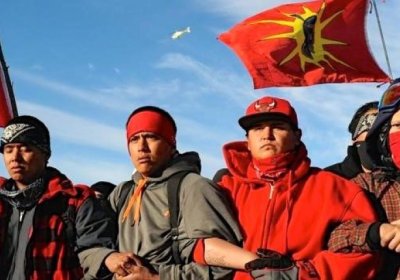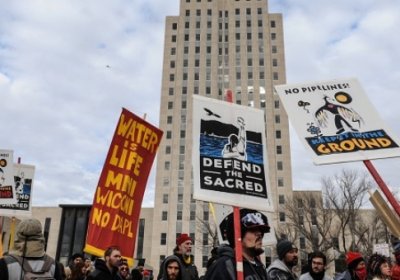Indigenous scholar and activist Nick Estes’ book, Our History is the Future, provides a vivid account of the movement to halt Dakota Access Pipeline, writes Simon Butler.
Standing Rock
The Standing Rock Sioux Tribe recently won a major legal victory in federal court which may have the power to force the shutdown of the $3.8 billion Dakota Access pipeline.
“Water is life!” was the cry heard throughout Washington, DC on March 10 as thousands of people marched for Indigenous rights and the sovereignty of native nations, Common Dreams said that day.
First Nations-led water protectors have called for mass protests after the US Army Corps of Engineers granted the final approval on February 7 for Energy Transfer Partners (ETP) to resume building the widely opposed Dakota Access pipeline (DAPL).
The approval came after President Donald Trump overturned an Obama administration order to halt construction under Lake Oahe, a large reservoir connected to the Missouri River that provides water to the Standing Rock Indian Reservation in North Dakota and South Dakota.
Police in North Dakota arrested 76 people at the Standing Rock protest camp on February 1 as the Army Corp of Engineers cleared the way to continue construction of the Dakota Access Pipeline (DAPL) through Native American land.
The US$3.78 billion DAPL project involves building a 1886-kilometre long pipeline to shift almost half-a-million barrels of oil a day. Its route passes through Native American land on the Standing Rock Indian Reservation, threatening water supplies and sacred sites.
Donald Trump’s move to revive the Keystone XL and Dakota Access pipelines sparked a number of emergency protests on January 24 in Washington, New York, Los Angeles, San Francisco, Seattle, Philadelphia and other cities, Democracy Now! reported the next day.
On January 24, Trump issued executive orders that revived the two mega-pipeline projects, which the Obama administration had blocked in the face of huge protests.
The Standing Rock Sioux tribe and supporters have said they will resist US President Donald Trump's executive order to allow construction of the Dakota Access pipeline (DAPL) that threatens to destroy water supply of the Standing Rock reservation in North Dakota, as well as Native American sacred sites.
On December 4, celebrations erupted at Standing Rock after the U.S. Army Corps of Engineers announced it had denied the Dakota Access Pipeline Company a permit to build the final segment of the $3.8 billion project and would study a possible reroute of the pipeline. The announcement from the U.S.
Update: The US Army Corps of Engineers denied the Dakota Access pipeline company a permit to drill underneath the Missouri River on December 4 Democracy Now! reported. The decision officially halts construction of the US$3.8 billion oil pipeline that has faced months of resistance from the Standing Rock Sioux in North Dakota and members of more than 200 indigenous nations from across the Americas, as well as their non-Native allies.
The US$3.8 billion Dakota Access Pipeline (DAPL), if completed, would carry up to 570,000 barrels of crude oil daily from the North Dakota to refineries in Illinois.
If built, it will cross the Missouri River, the main source of drinking water and irrigation for 8200 residents of the Standing Rock reservation.
Those facts have turned DAPL into a flashpoint in dual struggles for climate justice and Native rights.
United Nations Special Rapporteur on the rights to freedom of peaceful assembly and association Maina Kiai issued a blistering condemnation on November 15 of the militarised response to the Standing Rock water protectors’ peaceful protest against the Dakota Access Pipeline.
“We know that elections and individuals alone don’t create change — movements do.”
This is the maxim that guided the huge United States-wide action that took place on November 15. There were nearly 200 protests against the Dakota Access pipeline, the largest since the US government requested the project be temporarily halted in September.
- Page 1
- Next page











